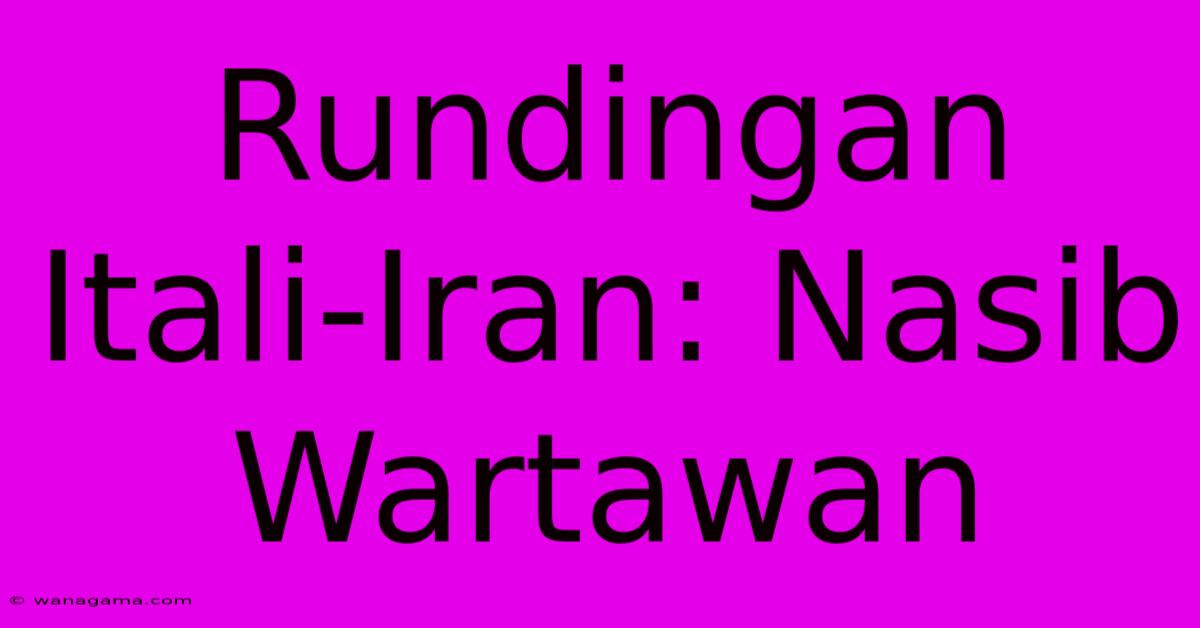Rundingan Itali-Iran: Nasib Wartawan

Discover more detailed and exciting information on our website. Click the link below to start your adventure: Visit Best Website mr.cleine.com. Don't miss out!
Table of Contents
Rundingan Itali-Iran: Nasib Wartawan Di Tengah Gejolak Politik
The ongoing negotiations between Italy and Iran have cast a long shadow, particularly on the fate of journalists operating within this complex geopolitical landscape. The situation is fraught with uncertainty, raising critical questions about press freedom, diplomatic maneuvering, and the inherent risks faced by those reporting from conflict zones and politically sensitive regions. This article delves into the intricacies of the Italian-Iranian talks, examining their impact on journalists and the broader implications for freedom of the press.
The High-Stakes Negotiations: A Balancing Act
The negotiations between Italy and Iran are multifaceted, encompassing a range of issues from trade and economic cooperation to human rights and the release of imprisoned citizens. The political climate is volatile, with underlying tensions stemming from long-standing regional conflicts and differing geopolitical alignments. This volatile environment directly influences the operational space for journalists, creating a precarious situation for those attempting to report objectively and accurately.
Navigating a Complex Web of Interests
Italy, a member of the European Union, seeks to maintain a balance between its economic interests in Iran and its commitment to upholding human rights and press freedom. Iran, on the other hand, operates within a tightly controlled media environment, where critical reporting is often suppressed. This inherent tension creates a challenging context for journalists trying to navigate the complexities of reporting on these negotiations. Any perceived bias, whether real or perceived, can have serious consequences for those operating within Iranian territory or reporting on Iran-related matters.
The Plight of Journalists: Risks and Realities
Journalists covering the Italian-Iranian negotiations face a multitude of challenges:
1. Access Restrictions: Gaining access to information and sources within Iran is incredibly difficult. The Iranian government tightly controls access to officials and key events, making independent reporting a significant challenge. Journalists may face obstacles such as visa denials, arbitrary arrests, and limitations on movement.
2. Surveillance and Intimidation: Journalists reporting on sensitive political matters, particularly those critical of the Iranian government, often face surveillance, intimidation, and harassment. This can range from online threats and cyberattacks to physical threats and even imprisonment.
3. Legal and Regulatory Hurdles: The legal framework in Iran regarding press freedom is restrictive. Laws related to national security, defamation, and insult to religious figures are frequently used to suppress critical reporting and silence dissenting voices. Foreign journalists are especially vulnerable to these legal frameworks.
4. Self-Censorship: The combination of these factors often leads to self-censorship. Journalists may choose to avoid sensitive topics or soften their reporting to avoid repercussions. This self-censorship can undermine the accuracy and objectivity of news coverage.
The Impact on Information Flow: A Threat to Transparency
The difficulties faced by journalists directly impact the flow of accurate information concerning the Italian-Iranian negotiations. Restricted access and self-censorship limit the public's ability to understand the complexities of these talks and the potential ramifications. This lack of transparency can hinder informed public discourse and limit accountability.
Protecting Journalists: A Call for Action
Protecting journalists covering the Italian-Iranian negotiations is paramount for upholding press freedom and ensuring transparency. Several actions are crucial:
1. Diplomatic Pressure: International organizations and governments should exert diplomatic pressure on Iran to respect press freedom and allow journalists to operate freely and without fear of reprisal.
2. Support for Independent Media: Supporting independent media outlets in Iran and the region is vital. This includes providing funding, training, and legal assistance to journalists working under challenging circumstances.
3. International Monitoring: Independent organizations should monitor the situation closely, documenting human rights violations against journalists and advocating for their release.
4. Promoting Safety Training: Providing safety training to journalists on risk assessment, security protocols, and digital security is essential to mitigating the risks they face.
The Broader Implications: A Global Concern
The challenges faced by journalists covering the Italian-Iranian negotiations are not unique to this specific situation. They reflect a broader global trend of increasing restrictions on press freedom and the growing risks faced by journalists worldwide. Protecting journalists and promoting press freedom are essential components of a healthy democracy and transparent governance.
Conclusion:
The Italian-Iranian negotiations represent a critical juncture for journalists. Their ability to report freely and accurately is essential for informing the public and ensuring accountability. The international community must actively work to protect journalists, promote press freedom, and ensure a transparent and informed public discourse surrounding these vital negotiations. The future of press freedom hinges on the collective commitment to safeguarding the rights of those who bring the news to the world. Only through concerted efforts can we ensure that the voices of journalists are not silenced and the truth remains accessible. The ongoing struggle for press freedom demands constant vigilance and unwavering support for those who risk their lives to inform and enlighten us.

Thank you for visiting our website wich cover about Rundingan Itali-Iran: Nasib Wartawan. We hope the information provided has been useful to you. Feel free to contact us if you have any questions or need further assistance. See you next time and dont miss to bookmark.
Also read the following articles
| Article Title | Date |
|---|---|
| T20 I Nz Vs Sl Kemenangan Nz | Dec 29, 2024 |
| Brighton Brentford 0 0 Di Amex | Dec 29, 2024 |
| Itali Susah Bebaskan Wartawan Di Iran | Dec 29, 2024 |
| Jurnalist Itali Cecilia Sala Ditahan Iran | Dec 29, 2024 |
| Aot Penerbangan Jeju Air 7 C 2216 Tanpa Kejadian | Dec 29, 2024 |
